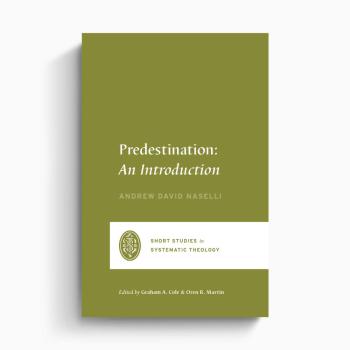Review of Teach Us to Want: Longing, Ambition, & the Life of Faith by Jen Pollock Michel
Based on the title, the jacket blurb, the promotional materials, the opening chapter, and the final paragraphs of the book, Teach Us to Want is a book about the role of desire in the life of a Christian. The foreword describes it as ‘a practical theology of desire.’ Michel, like many Christians, once labored under the misapprehension that the Christian life is diametrically and fundamentally opposed to desire—that desire is always a danger sign, and that in any given situation, the right or ‘Christian’ thing to do is the opposite of whatever you actually want to do. And, by extension, whatever you don’t want to do is precisely what you ought to be doing. Do you desperately want not to serve as a missionary in deepest, hottest Africa? Obviously that means you should pack your bags and go. Now.
It is certainly true that a life of following Christ necessarily entails a certain amount of self-denial. If anyone would come after me, let him deny himself and take up his cross and follow me (Matt. 16:24). But God, in His kindness, doesn’t merely ask us to squelch desire at every turn. In His grace, He transforms our desires by conforming them to His character and will. These new, holy desires—for Him, for His Word, for His people, for His glory—are to be embraced and ultimately fulfilled. As such, the Christian’s attitude toward his own desire is not as simple as uniform denial or indulgence. It entails discernment. Those desires which are contrary to the Word and the Gospel are to be resisted; those which are consistent with the Word and the Gospel are to be celebrated and pursued. And as we learn and grow by the ministry of the Spirit in applying the Word and the Gospel to our hearts, our desires shift and align themselves more and more with the desires of the One we serve.
This is the theme I expected Michel to develop—instruction on how to distinguish godly desires from fleshly ones, as well as discussion of God’s work in the transformation and redemption of our desires.
Instead, after the introductory chapter on desire followed by an excellent discussion of the corruption our sin nature works on those desires, I found myself immersed in a step-by-step meditation on the Lord’s Prayer, as follows:
- ‘Lead us not into temptation’, or prayer for protection from our sinful desires (Chapter 3, Precipice of Hope: Grace)
- ‘Thy kingdom come’, or our role in preaching the Gospel and serving others (Chapter 4, Project Kingdom: Good News)
- ‘Our Father’, or the character and sovereignty of God (Chapter 5, Visions of Sugarplums: Scripture)
- ‘Your will be done’, or trusting God’s will and Word in difficult times (Chapter 6, The Business of Holy: Prayer)
- ‘Give us this day our daily bread’, or prayer for material needs (Chapter 7, Bread and Butter: Petition) ‘Forgive us our sins’, or the value of confession (Chapter 8, If the Shoe Fits: Confession)
- ‘As we forgive others’, or the importance of the local church (Chapter 9, Be My Neighbor: Community)
In the final chapter, Michel returns to her discussion of desire, reminding us that hard times work to change us by realigning our desires with Christ and encouraging us to pray boldly for these new sanctified desires.
I enjoyed and appreciated Michel’s thoughts. Whether discussing the Lord’s prayer or the theology of desire, her observations and insights were biblically supported and theologically sound. She’s dead right—our desires are corrupted by sin, but God does transform them over time. Across-the-board disavowal of any and every desire is not appropriate. Similarly, Michel’s discussion of the Lord’s Prayer was both thoughtful and thought-provoking. So I’ve no real quibble with the substance of her book.
However, as I read through the book, it was not immediately apparent to me how these two seemingly disparate topics were connected; that is, how the Lord’s Prayer relates to the redemption of desire in the life of a Christian.
Don’t get me wrong. Michel is a fine writer, of a higher caliber than most of the devotional writers I’ve encountered recently. She manages to write in a manner that is engagingly literary without being unduly familiar or showy. There is a slightly more educated flavor to her writing than the average Evangelical devotional, and she doesn’t come across as trying too hard. Michel writes like someone who reads a lot—and not just Christian books or whatever popular fiction is flying up the bestseller lists. She writes like someone who reads and appreciates truly good books, past and present. I hope she keeps writing.
Admittedly, I did struggle some with her more meditative, narrative style. I tend to be attracted to clear, linear thinkers who present their ideas in a direct and logical fashion. The meandering ‘meditations on a theme’ style is a challenge for me. As I read Teach Us to Want, I found myself struggling to follow her train of thought and her line of reasoning. I could identify the portion of the Lord’s Prayer being examined in each chapter, but I had a dilly of a time identifying her takeaway points. But even when I couldn’t see where she was going or connect up the points she was making, she was very readable.
So here’s my takeaway point: If you’re looking for a book on the Christian view of desire, this book isn’t it. But if you’re looking for a well-written meditation on the Lord’s Prayer presented through the narrative lens of personal experience, then I happily recommend Teach Us to Want.
_______________________________________________________________
Reviewed in connection with the Patheos Book Club.
Alexis Neal teaches at Southwest Baptist Missouri University in Bolivar, Missouri. She (semi-)regularly reviews young adult literature at www.childrensbooksandreviews.com and everything else at quantum-meruit.blogspot.com.












